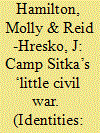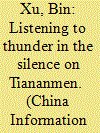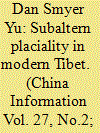|
|
|
Sort Order |
|
|
|
Items / Page
|
|
|
|
|
|
|
| Srl | Item |
| 1 |
ID:
184078


|
|
|
|
|
| Summary/Abstract |
Drawing on qualitative research conducted in the summer of 2018, we explore the role of camp programming and staff discourse in the (re)production of white ignorance at Camp Sitka, a wilderness Boy Scouts of America camp. Using epistemologies of ignorance, we examine two important pieces of nostalgic camp programming and the justifications and surprise to them among two seemingly antithetical groups of camp staff members, traditional ‘old Sitka’ conservatives and progressive ‘new Sitka’ staff. We argue that both pieces of camp programming mobilised nostalgic longing for an imagined version of the American past, made possible through the active forgetting of histories of white violence. Both nostalgia and surprise arose from and reproduced white ignorance. More specifically, both ‘nostalgia’ and ‘surprise’ were narrative distancing moves that obscured racist realities, which fuelled a cycle of ignorance that ultimately helped insulate systems of racial inequity from meaningful critique.
|
|
|
|
|
|
|
|
|
|
|
|
|
|
|
|
| 2 |
ID:
184088


|
|
|
|
|
| Summary/Abstract |
‘Forgetting’ has been widely used in academic and public discourses of the memory of the 1989 Tiananmen Incident. The term, however, is conceptually unclear, empirically ineffective, and ethically problematic. Conceptually, it relies on a problematic assumption that silence means forgetting. Empirically, it lumps together different states of memory: ‘don’t remember, don’t talk about, don’t know, and don’t care.’ Ethically, it allows a broad, unjust moral accusation of those who remember but remain silent for various reasons. I argue that ‘silence’ provides greater conceptual precision, more analytical subtlety, and less ethical liability. Silence does not mean forgetting. Nor does it always mean the complete absence of sound. Rather, it refers to the absence of certain discourses about the past. I propose a perspective based on different forms of silence – ‘silencing, silenced, and silent’ – and illustrate it in an analysis of the memory of Tiananmen. Contrary to conventional wisdom, the analysis shows that the Chinese state initially intended to create a ‘covert silence’ – forcing people to remember rather than forget the official stories and silencing other narratives – and then an ‘overt silence’ in which all mention of the event was absent. Even underneath overt silence, however, are various experiences with ambiguities and nuances. The term silence also recognizes individuals’ ethical-political dilemmas under a repressive regime and aims to provide a language for an equal and inclusive truth-and-reconciliation process in the future.
|
|
|
|
|
|
|
|
|
|
|
|
|
|
|
|
| 3 |
ID:
122635


|
|
|
|
|
| Publication |
2013.
|
| Summary/Abstract |
I attempt to write this article as a pathology of modernity in connection with how place, memory, and subalternity are expressed by urban Tibetans in China. The literary works of Shogdong, a contemporary Tibetan writer and cultural critic, are the focus of my interpretation of the sociopolitical, religious, and psychological meanings of an anti-traditional discourse among urban Tibetans. My pathologizing this intra-Tibetan discourse is meant to discern how modern subjectivity or its mindscape in the case of urban Tibetans is inherently conditioned by place as both geographic landscape and locus of memory. I then argue that the negation of anti-traditional Tibetans of their native traditional cultural and religious values and practices is a remembering process which is inversed as a process of seemingly intentional subversion, rejection, and forgetting; and I further argue that the anti-traditionalist imagining of a modern Tibet, though it uses nomenclature identical to that of China's socialism, is not a replica of China's modernity, but an exercise of a power discourse in a subaltern sense.
|
|
|
|
|
|
|
|
|
|
|
|
|
|
|
|
|
|
|
|
|